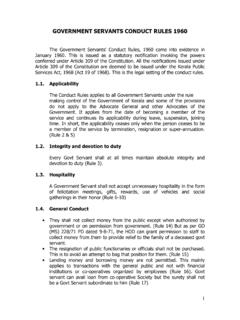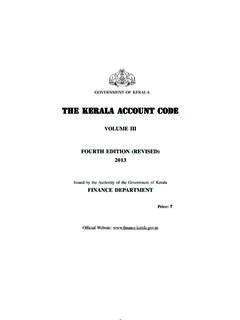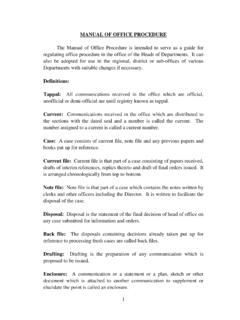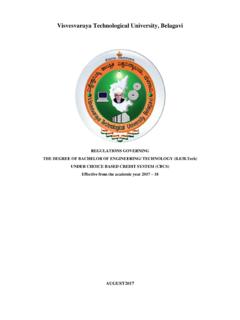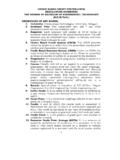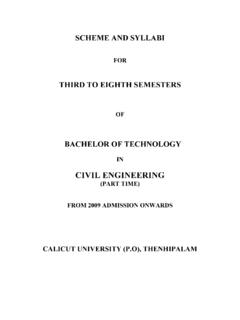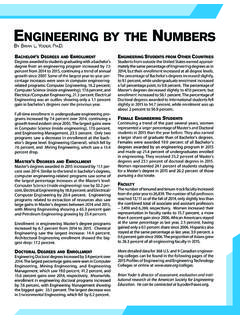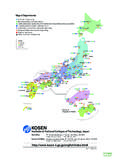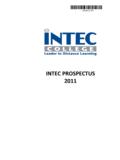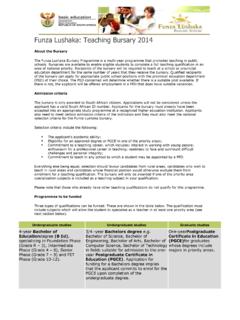Transcription of ELECTRONICS AND COMMUNICATION ENGINEERING
1 SCHEME AND SYLLABI FOR THIRD TO EIGHTH SEMESTERS OF bachelor OF technology IN ELECTRONICS AND COMMUNICATION ENGINEERING FROM 2009 ADMISSION ONWARDS CALICUT UNIVERSITY ( ), THENHIPALAM SCHEME FOR ECE BRANCH OF CALICUT UNIVERSITY 2009 THIRD SEMESTER Hrs/week Marks Code Subject L T P/D Internal Sem- End Sem. End Duration -Hrs Credits EN09 301 ENGINEERING Mathematics III 3 1 30 70 3 4 EN09 302 Humanities and COMMUNICATION Skills 2 1 30 70 3 3 EC09 303 Network Analysis & Synthesis 4 1 30 70 3 5 EC09 304 Signals and Systems 3 1 30 70 3 4 EC09 305 Digital ELECTRONICS 3 1 30 70 3 4 EC09 306 Electrical ENGINEERING 3 1 30 70 3 4 EC09 307(P) Digital ELECTRONICS Lab 3 50 50 3 2 EC09 308(P) Electrical ENGINEERING Lab 3 50 50 3 2 TOTAL 18 6 6 28 FOURTH SEMESTER Hrs/week Marks Code Subject L T P Internal Sem- End Sem. End Duration -Hrs Credits EN09 401(B) ENGINEERING Mathematics IV 3 1 30 70 3 4 EN09 402 Environmental Science 2 1 30 70 3 3 EC09 403 electronic Circuits 4 1 30 70 3 5 EC09 404 Analog COMMUNICATION 3 1 30 70 3 4 EC09 405 Computer Organization & Architecture 3 1 30 70 3 4 EC09 406 Solid State Devices 3 1 30 70 3 4 EC09 407(P) electronic Circuits Lab 3 50 50 3 2 EC09 408(P) Analog COMMUNICATION Lab 3 50 50 3 2 TOTAL 18 6 6 28 FIFTH SEMESTER Hrs/week Marks Code Subject L T P Internal Sem- End Sem.
2 End Duration -Hrs Credits EC09 501 Digital Signal Processing 4 1 30 70 3 5 EC09 502 Quantitative Techniques For Managerial Decisions 3 1 30 70 3 4 EC09 503 Electromagnetic Field Theory 3 1 30 70 3 4 EC09 504 Digital COMMUNICATION 3 1 30 70 3 4 EC09 505 Microprocessors & Microcontrollers 3 1 30 70 3 4 EC09 506 Linear Integrated Circuits 2 1 30 70 3 3 EC09 507(P) Microprocessors & Microcontrollers Lab 3 50 50 3 2 EC09 508(P) Linear Integrated Circuits Lab 3 50 50 3 2 TOTAL 18 6 6 28 SIXTH SEMESTER Hrs/week Marks Code Subject L T P Internal Sem- End Sem. End Duration -Hrs Credits EC09 601 Basics of VLSI Design 4 1 30 70 3 5 EN09 602 ENGINEERING Economics and Principles of Management 3 1 30 70 3 4 EC09 603 Radiation and Propagation 3 1 30 70 3 4 EC09 604 Control Systems 3 1 30 70 3 4 EC09 605 Optical COMMUNICATION 2 1 30 70 3 3 EC09 Lxx Elective I 3 1 30 70 3 4 EC09 607(P) Digital COMMUNICATION & DSP Lab 3 50 50 3 2 EC09 608(P) Mini Project 3 50 50 3 2 TOTAL 18 6 6 28 Elective I EC09 L01 Power ELECTRONICS EC09 L02 Numerical methods for Engineers EC09 L03 Entrepreneurship EC09 L04 Speech & Audio Processing EC09 L05 Satellite COMMUNICATION .
3 SEVENTH SEMESTER Hrs/week Marks Code Subject L T P Internal Sem- End Sem. End Duration -Hrs Credits EC09 701 Information Theory and Coding 4 1 30 70 3 5 EC09 702 Microwave ENGINEERING 3 1 30 70 3 4 EC09 703 Analog & Mixed MOS Circuits 2 1 30 70 3 3 EC09 704 Digital System Design 2 1 30 70 3 3 EC09 Lxx Elective II 3 1 30 70 3 4 EC09 Lxx Elective III 3 1 30 70 3 4 EC09 707(P) COMMUNICATION systems Lab 3 50 50 3 2 EC09 708(P) VLSI Design Lab 3 50 50 3 2 EC09 709(P) Project 1 100 1 TOTAL 17 6 7 28 EIGHTH SEMESTER Hrs/week Marks Code Subject L T P Internal Sem- End Sem. End Duration -Hrs Credits EC09 801 Data & COMMUNICATION Network 4 1 30 70 3 5 EC09 802 Wireless Mobile COMMUNICATION 2 1 30 70 3 3 EC09 Lxx Elective IV 3 1 30 70 3 4 EC09 Lxx Elective V 3 1 30 70 3 4 EC09 805(P) Seminar 3 100 2 EC09 806(P) Project 11 100 7 EC09 807(P) Viva Voce 100 3 TOTAL 12 4 14 28 ELECTIVES EC09 L06 Soft Computing EC09 L07 High Speed Digital Design EC09 L08 Introduction to MEMS EC09 L09 Multimedia COMMUNICATION Systems EC09 L10 Management Information systems EC09 L11 Cryptography & Network security EC09 L12 Antenna Theory & Design EC09 L13 Microwave Active Devices & Circuits EC09 L14 Internet technology EC09 L15 Television & Radar ENGINEERING EC09 L16 Embedded systems EC09 L17 Photonic Switching And Network EC09 L18 Nano technology EC09 L19 Advanced semiconductor device technology EC09 L20 Mobile computing EC09 L21 Image & video Processing EC09 L22 Advanced digital signal Processing EC09 L23 Data Structures & Algorithms EC09 L24 electronic Packaging EC09 L25 Biomedical Instrumentation GLOBAL ELECTIVES CE09 L25 Finite Element Analysis ME09 L23 Industrial Safety ENGINEERING EE 09 L24 Mechatronics EE 09 L25 Robotics & Automation CS09 L23
4 Simulation & Modeling CS09 L25 Pattern Recognition IC09 L25 Aerospace ENGINEERING and Navigation Instrumentation IC09 L23 Bio Informatics AI09 L25 Probability and Random process BM09 L24 Virtual Instrumentation EN09 301: ENGINEERING Mathematics III (Common for all branches) Objective This course provides a quick overview of the concepts and results in complex analysis that may be useful in ENGINEERING . Also it gives an introduction to linear algebra and Fourier transform which are wealths of ideas and results with wide area of application. Module I: Functions of a Complex Variable (13 hours) Functions of a Complex Variable Limit Continuity Derivative of a Complex function Analytic functions Cauchy Riemann Equations Laplace equation Harmonic Functions Conformal Mapping Examples: Zn, sinz, cosz, sinhz, coshz, (z+1/Z ) Mobius Transformation. Module II: Functions of a Complex Variable (14 hours) Definition of Line integral in the complex plane Cauchy s integral theorem (Proof of existence of indefinite integral to be omitted) Independence of path Cauchy s integral formula Derivatives of analytic functions (Proof not required) Taylor series Laurent series Singularities and Zeros Residues Residue Integration method Residues and Residue theorem Evaluation of real integrals.
5 Module III: Linear Algebra (13 hours) - Proofs not required Vector spaces Definition, Examples Subspaces Linear Span Linear Independence Linear Dependence Basis Dimension Ordered Basis Coordinate Vectors Transition Matrix Orthogonal and Orthonormal Sets Orthogonal and Orthonormal Basis Gram Schmidt orthogonolisation process Inner product spaces Examples. Module IV: Fourier Transforms (14 hours) Fourier Integral theorem (Proof not required) Fourier Sine and Cosine integral representations Fourier Transforms Fourier Sine and Cosine Transforms Properties of Fourier Transforms. Teaching scheme Credits: 4 3 hours lecture and 1 hour tutorial per week Text Books Module I: Erwin Kreysig, Advanced ENGINEERING Mathematics, 8e, John Wiley and Sons, Inc. Sections: , , , , , Module II: Erwin Kreysig, Advanced ENGINEERING Mathematics, 8e, John Wiley and Sons, Inc. Sections: , , , , , , , , Module III: Bernaed Kolman, David R Hill, Introductory Linear Algebra, An Applied First Course, Pearson Education.
6 Sections: , , , , , , Module IV: Wylie and Barrett, Advanced ENGINEERING Mathematics, McGraw Hill. Sections: , , Reference books 1. H S Kasana, Complex Variables, Theory and Applications, 2e, Prentice Hall of India. 2. John M Howie, Complex Analysis, Springer International Edition. 3. Shahnaz bathul, Text book of ENGINEERING Mathematics, Special functions and Complex Variables, Prentice Hall of India. 4. Gerald Dennis Mahan, Applied mathematics, Springer International Edition. 5. David Towers, Guide to Linear Algebra, MacMillan Mathematical Guides. 6. Howard Anton, Chris Rorres, Elementary Linear Algebra, Applications Version, 9e, John Wiley and Sons. 7. Anthony Croft, Robert Davison, Martin Hargreaves, ENGINEERING Mathematics, 3e, Pearson Education. 8. H Parthasarathy, ENGINEERING Mathematics, A Project & Problem based approach, Ane Books India. 9. B V Ramana, Higher ENGINEERING Mathematics, McGrawHill. 10. Sarveswara Rao Koneru, ENGINEERING Mathematics, Universities Press.
7 11. J K Sharma, Business Mathematics, Theory and Applications, Ane Books India. 12. John bird, Higher ENGINEERING Mathematics, Elsevier, Newnes. 13. M Chandra Mohan, Vargheese Philip, ENGINEERING I, II, III & IV., Sanguine Technical Publishers. 14. N Bali, M Goyal, C Watkins, Advanced ENGINEERING Mathematics, A Computer Approach, 7e, Infinity Science Press, Fire Wall Media. 15. V R Lakshmy Gorty, Advanced ENGINEERING I, II., Ane Books India. 16. Sastry , Advanced ENGINEERING I and II., Prentice Hall of India. 17. Lary C Andrews, Bhimsen K Shivamoggi, Integral Transforms for Engineers, Prentice Hall of India. University Examination Pattern PART A: Short answer questions (one/two sentences) 5 x 2 marks=10 marks All questions are compulsory. There should be at least one question from each module and not more than two questions from any module. PART B: Analytical/Problem solving questions 4 x 5 marks=20 marks Candidates have to answer four questions out of six.
8 There should be at least one question from each module and not more than two questions from any module. PART C: Descriptive/Analytical/Problem solving questions 4 x 10 marks=40 marks Two questions from each module with choice to answer one question. Maximum Total Marks: 70 Internal Continuous Assessment (Maximum ) 60% Tests (minimum 2) 30% Assignments (minimum 2) such as home work, problem solving, group discussions, quiz, literature survey, seminar, term project, software exercises, etc. 10% Regularity in the class EN09 302: HUMANITIES AND COMMUNICATION SKILLS (COMMON TO ALL BRANCHES) Objectives To identify the most critical issues that confronted particular periods and locations in history; To identify stages in the development of science and technology ; to understand the purpose and process of COMMUNICATION ; to produce documents reflecting different types of COMMUNICATION such as technical descriptions, proposals ,and reports; To develop a positive attitude and in the workplace; and To develop appropriate social and business ethics.
9 Module I (8 hours) Humanities, Science and technology : Importance of humanities to technology , education and society Impact of science and technology on the development of modern civilization. Contributions of ancient civilization: Chinese, Indian, Egyptian and Greek. Cultural, Industrial, Transportation and COMMUNICATION revolutions. Advances in modern India: Achievements in information, COMMUNICATION and space technologies. Module II (9 hours) Concept of COMMUNICATION : The speaker/writer and the listener/reader, medium of COMMUNICATION , barriers to COMMUNICATION , accuracy, brevity, clarity and appropriateness Reading comprehension: Reading at various speeds, different kinds of text for different purposes, reading between lines. Listening comprehension: Comprehending material delivered at fast speed and spoken material, intelligent listening in interviews Speaking: Achieving desired clarity and fluency, manipulating paralinguistic features of speaking, task oriented, interpersonal, informal and semi formal speaking, making a short classroom presentation.
10 Group discussion: Use of persuasive strategies, being polite and firm, handling questions and taking in criticisms on self, turn taking strategies and effective intervention, use of body language. Module III (10 hours) Written COMMUNICATION : Note making and taking, summarizing, notes and memos, developing notes into text, organization of ideas, cohesion and coherence, paragraph writing, ordering information in space and time, description and argument, comparison and contrast, narrating events chronologically. Writing a rough draft, editing, proof reading, final draft and styling text. Technical report writing: Synopsis writing, formats for reports. Introductory report, Progress report, Incident report, Feasibility report, Marketing report, Field report and Laboratory test report Project report: Reference work, General objective, specific objective, introduction, body, illustrations using graphs, tables, charts, diagrams and flow charts.
